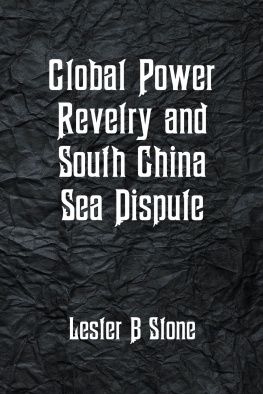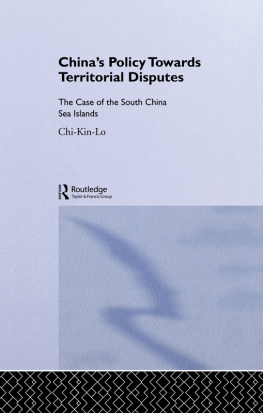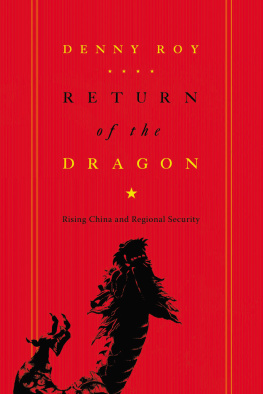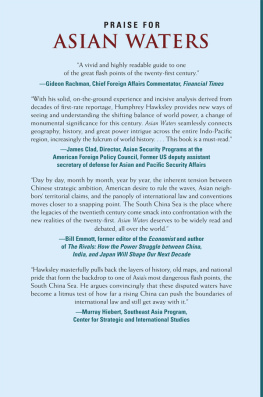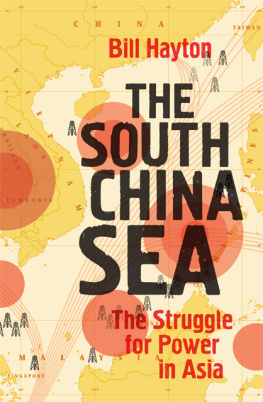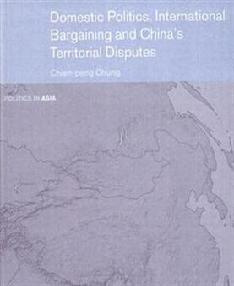Copyright 2018
ISBN : 9789352978588
Design and Setting By
Alpha Editions
(A Vij Publishing Group Company)
www.vijbooks.com
email
All rights reserved. No part of this publication may be reproduced,
distributed, or transmitted in any form or by means, including
photocopying, recording, or other electronic or mechanical methods,
without the prior written permission of the publisher.
The views and characters expressed in the book are of the author
and his/her imagination and do not represent the views of the
Publisher.
South China Sea is the dominant term used in English for the sea, and the name in most European languages is equivalent, but it is sometimes called by different names in Chinas neighboring countries, often reflecting historical claims to hegemony over the sea. The disputes in the South China Sea have the potential to ignite a broader regional conflagration. Territorial and jurisdictional disputes in the South China Sea continue to strain relations between China and other countries in Southeast Asia, risking a military escalation. To protect its political, security, and economic interests in the region, the United States has challenged Chinas assertive territorial claims and land reclamation efforts by conducting freedom of navigation operations and bolstering support for Southeast Asian partners.
The South China Sea disputes between China and its South East Asian neighbours which has been festering for decades assumed conflictual contours since 2008-2009 and after China declared it as a core interest for China and on which it would be ready to go to war to defend its self-proclaimed sovereignty. Chinas such assertions should not surprise the international community as it is very much in keeping with Chinas posturings and its marked propensity to resort to conflict to resolve territorial disputes rather than by conflict resolution initiatives.
As a non-claimant state in the South China Sea dispute, Singapore has shown great interest in the evolution and handling of the regional hotspot issue. Singapores policy towards the South China Sea issue has been fairly consistent in the past decades. One particular area of concern for Singapore has been the freedom and safety of navigation. Singapore has also done quite a lot to enhance maritime security in the region.
For the US and China, the South China Sea is more a matter of the geopolitics of sea control. The US Navy has policed the crucial maritime waterway for most of the past 70 years, and believes that China wants to slowly nudge it out of crucial parts of the western Pacific. A dominant position in the South China Sea would give Beijing a platform to exert greater influence over the foreign policies of its neighbours and the terms of economic engagement in east Asia.
China and the Southeast Asian Claimants, the rapid modernization of regional armed forces and worsening geopolitical rivalries among the Great Powers, the South China Sea will remain an area of diplomatic wrangling and potential conflict for the foreseeable future. Meanwhile, the South China Sea is a crucial part of the countrys overall neighboring diplomacy and security, which need to be peacefully solved for Chinas sustainable peace and prosperity.
This is a reference book. All the matter is just compiled and edited in nature, taken from the various sources which are in public domain.
As the book addresses this crucial issue quite deftly, it is hoped that it would prove to be a source of great information for the reader.
Editor
South China Sea: Building
up Trouble
Whoever replaces Barack Obama will face many difficult choices but few are likely to be as stark as those in the Asia Pacific region. In a 497-page, densely argued ruling this week, an international tribunal in The Hague blew away the legal ambiguity that has long surrounded Chinas claim to control the bulk of the South China Sea one of the busiest trading routes in the world.
How the White House responds to the verdict in the coming months will help define Washingtons relationship with Beijing for years, and dramatically influence the geopolitics of the region.
Washington sees the ruling, issued by the Permanent Court of Arbitration, after a complaint from the Philippines, as a victory for what some US officials describe as a 21st century rules-based order over Chinas 19th-century plans for its own sphere of influence.
By rejecting so many of the assumptions that underpinned Beijings claims in the South China Sea, the tribunal has put it on the spot. If China continues occupying reefs and developing them into potential military bases a process that has accelerated since 2014 it will be acting outside the bounds of international law. The US would then have to decide its next steps and how much military force it is prepared to deploy.
China has to make a decision is it going to adhere to the rule of law and act like a world leader with responsibilities, or is it going to go its own course, says Ben Cardin, the senior Democrat on the Senate foreign relations committee. However, he adds: They will probably assert their sovereignty by additional island building or military activity.
In an interview before the court ruling was announced, Max Baucus, US ambassador to China, said one of his messages to government officials in Beijing was that were in a whole new chapter here... The old chapter was talk for the sake of talk, agree to disagree, he added. Were past that. The new chapter is [about] actions.
Competing rivalries
There are multiple rivalries in the South China Sea and they operate on two levels. A host of islands, rocks and reefs are claimed by China, Vietnam, the Philippines, Malaysia, Brunei and Taiwan, and the disputes combine fishing rights, potential natural resources and national pride.
For the US and China, the South China Sea is more a matter of the geopolitics of sea control. The US Navy has policed the crucial maritime waterway for most of the past 70 years, and believes that China wants to slowly nudge it out of crucial parts of the western Pacific. A dominant position in the South China Sea would give Beijing a platform to exert greater influence over the foreign policies of its neighbours and the terms of economic engagement in east Asia.
The Hague ruling has delivered a significant blow to that project. The five-judge panel ruled unanimously that China does not have historic rights to the resources within its infamous nine-dash line, which delineates its claim to about 85 per cent of the waterway.
The tribunal also said that none of the land features in the Spratlys archipelago in the centre of the South China Sea could be considered as islands, which under international law would give them a 200-mile exclusive economic zone. The result which Beijing contests sharply curtails its legal claim to control.
For the US, the ruling gives it the chance to demonstrate that the channel is an international waterway where any navy can sail legally and raises the potential cost for China should it expand its military footprint through further land reclamation. But officials hope the verdict could also provide the basis for a new round of regional diplomacy about the disputes.
Over the past four years, the Obama administration has tried to beef up its presence in the region in order to deter China a policy known as the pivot. Michael McDevitt, a retired rear admiral, says that since 2013 there have been two US destroyers in the South China Sea at any one time.

